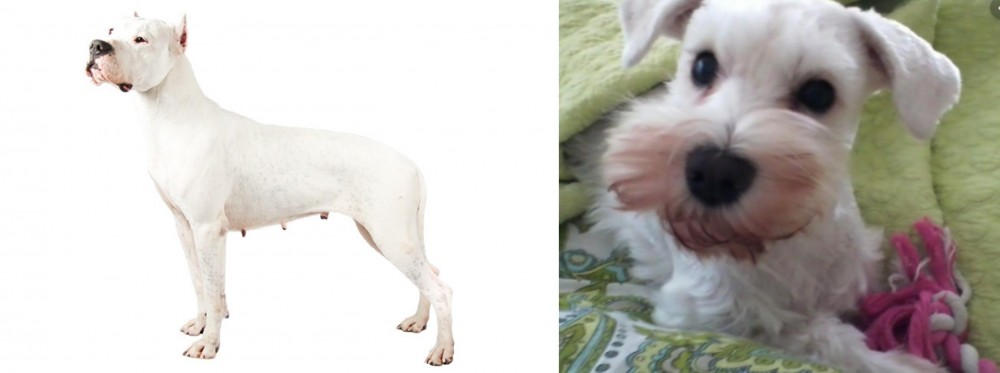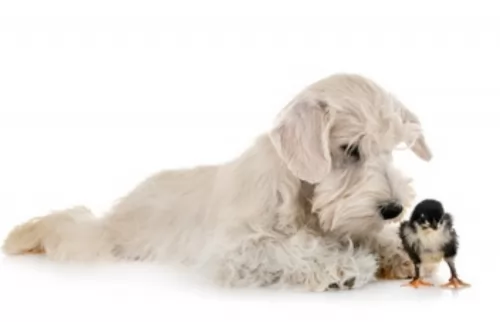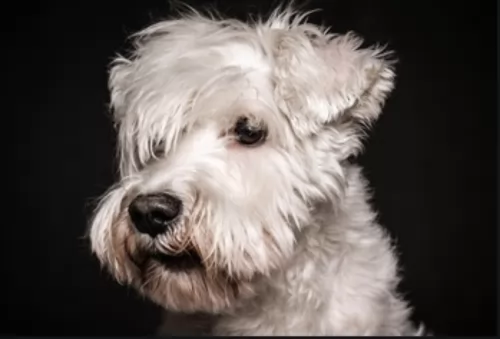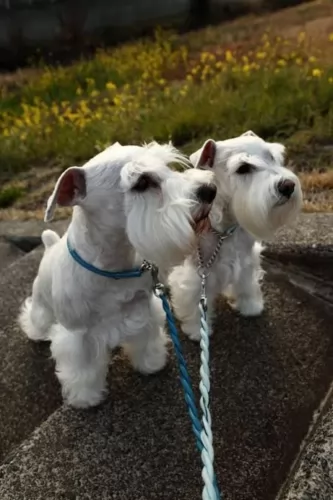 Petzlover
Petzlover Argentine Dogo is originated from Argentina but White Schnauzer is originated from Germany. Argentine Dogo may grow 32 cm / 13 inches higher than White Schnauzer. Argentine Dogo may weigh 38 kg / 84 pounds more than White Schnauzer. Both Argentine Dogo and White Schnauzer has almost same life span. Both Argentine Dogo and White Schnauzer has same litter size. Argentine Dogo requires Low Maintenance. But White Schnauzer requires Moderate Maintenance
Argentine Dogo is originated from Argentina but White Schnauzer is originated from Germany. Argentine Dogo may grow 32 cm / 13 inches higher than White Schnauzer. Argentine Dogo may weigh 38 kg / 84 pounds more than White Schnauzer. Both Argentine Dogo and White Schnauzer has almost same life span. Both Argentine Dogo and White Schnauzer has same litter size. Argentine Dogo requires Low Maintenance. But White Schnauzer requires Moderate Maintenance
 Known also as the Argentinian Mastiff, this large dog breed from Argentina is a descendant of the extinct Fighting Dog of Cordoba. People were looking for a fearless, companionable dog, and a man, Martinez from Argentina, began a selective breeding program to get a breed that wasn’t essentially geared to fighting.
Known also as the Argentinian Mastiff, this large dog breed from Argentina is a descendant of the extinct Fighting Dog of Cordoba. People were looking for a fearless, companionable dog, and a man, Martinez from Argentina, began a selective breeding program to get a breed that wasn’t essentially geared to fighting.
A number of breeds were mixed to achieve the desired characteristics in the Argentine Dogo breed.
It is unfortunate that the dog has been used for fighting and that it comes across as a dangerous dog so that today it is banned in several countries.
 The White Schnauzer was established in Germany in 2006 for people looking for this particular breed of dog but in white.
The White Schnauzer was established in Germany in 2006 for people looking for this particular breed of dog but in white.
The traditional color is salt and pepper. It seems that breed societies don’t allow the white breed, saying they don’t conform to the ideal breed standard.
The White Schnauzer is officially recognized in Germany, If you have a White Schnauzer you may not be able to show him with some of the major kennel clubs.
White is one of the four color varieties of the Miniature Schnauzer and it is also recognized by the Fédération Cynologique Internationale.
 The Argentine Dogo is a striking looking dog, large, muscular and powerful looking. He stands at about 60 – 68cm and weighs about 35 – 45kg.
The Argentine Dogo is a striking looking dog, large, muscular and powerful looking. He stands at about 60 – 68cm and weighs about 35 – 45kg.
He has a pure white coat. The coat is short and smooth. The ears are high set and most times cropped and erect.The Dogo’s tail is long and hangs naturally.
The Argentine Dogo is a companion dog today who can be loving and loyal towards his human family. He is a strong willed dog with a distrust of strangers and other animals.
He will most certainly require training and socialization if you want him to behave well among people and animals. With proper training and socialization, he can make a good family pet.
 There are a number of different types of White Schnauzer. The white Schnauzer is actually one of 4 color varieties and these dogs are always miniature Schnauzers.
There are a number of different types of White Schnauzer. The white Schnauzer is actually one of 4 color varieties and these dogs are always miniature Schnauzers.
You won’t easily find a Standard- or Giant dog in white. They aren’t albinos, as the skin does have some pigment.
These dogs also have that square-shaped build and they stand between 28 to 36 cm in height and weigh between 4 and 7kg.
The coat is wiry with a soft undercoat. The ears are often cropped to stand erect, but if left they are half-erect, half-floppy and fold forward.
The White Schnauzer is an intelligent dog who will be able to be socialized and trained easily.
He is an energetic little dog and very playful and will get along well with children, loving the games they provide and loving to spend time with all members of his family.
He is loving and affectionate and is willing to share his home and people with other dogs too. He will make you a good watchdog, perhaps encouraged because of his reserve with strangers.
If you provide him with the right amount of mental and physical stimulation, he can become a balanced dog with an amicable personality.
 This big, muscular white dog with his short white coat was once a hunting dog so he is active and energetic. He is also intelligent and courageous, loving his human family and wanting to protect them being a strong characteristic of his.
This big, muscular white dog with his short white coat was once a hunting dog so he is active and energetic. He is also intelligent and courageous, loving his human family and wanting to protect them being a strong characteristic of his.
The Argentine Dogo is social, strong, loyal and devoted and just wants to be part of his human family and all their activities. It is important that he is trained and socialized at an early age because then he is obedient and relaxed around people and pets in the home.
 The White Schnauzer is such an adaptable little dog and he will happily adapt to life in the city or in the countryside, just so long as he is close to his human companions and gets sufficient exercise.
The White Schnauzer is such an adaptable little dog and he will happily adapt to life in the city or in the countryside, just so long as he is close to his human companions and gets sufficient exercise.
He is a sociable dog that just loves to be around his human family and won’t like to be separated from them for too long.
He makes a great family dog when you provide him with the right food, a warm dry place to sleep, exercise and lots of love and attention.
 The Argentine Dogo can live to be between 10 and 12 years of age if he is looked after well, however about 10% of Argentine Dogos suffer from pigment-related deafness in one or both ears.
The Argentine Dogo can live to be between 10 and 12 years of age if he is looked after well, however about 10% of Argentine Dogos suffer from pigment-related deafness in one or both ears.
A dog can lose it’s hearing because of an ear infection. That is why it is so important to watch your pets ears and make sure that the ears aren’t red and that your pet isn't continually scratching his ears.
The most common cause of congenital deafness with a dog is pigment-related. Dogs with white coats are often affected by deafness and you commonly see deafness in dogs with white pigmented skin because they carry the piebald gene – the white coat and often blue eyes. Without a particular stem cell, the white dog’s body isn’t able to make a special layer of hearing cells.
There is a high rate of hip dysplasia with these dogs and more than 40% of Argentine Dogos have malformed hips. This isn’t a dog ailment to take lightly as it can lead to pain, discomfort and even lameness for your pet.
Skin diseases such as red, itchy allergies are also common with these dogs as well as eye diseases.
 While he is a spunky, robust type of dog, there are always going to be some health concerns to look out for.
While he is a spunky, robust type of dog, there are always going to be some health concerns to look out for.
Kidney stones may well not cause your pet the same pain that humans endure, but they are still a cause for concern. A kidney stone that gets too large and lodges in the ureter becomes a ureterolith. This can be very painful, resulting in pain and even vomiting.
The kidney can even swell and become damaged. Your dog could become critically ill, particularly because of the disrupted flow of urine.
Your pet will possibly have blood in the urine, fever, lethargy, poor appetite and weight loss. Veterinary-intervention will be imperative.
 With his short coat, the Argentine Dogo is a low maintenance dog, requiring a good brush twice a week. Its a pure white dog, and wiping him down with a damp cloth can keep his coat looking dazzling white and clean.
With his short coat, the Argentine Dogo is a low maintenance dog, requiring a good brush twice a week. Its a pure white dog, and wiping him down with a damp cloth can keep his coat looking dazzling white and clean.
Grooming your dog like this gives you a good chance to also check your pet for fleas and ticks and to ensure the skin is free from infection or dryness. You will find that he sheds a bit more in the hotter seasons, but during the colder months it will be wise to bring your pet indoors.
Other areas to consistently check with your dog are his nails – to keep them trimmed, to clean his teeth 2 or 3 times a week with proper canine toothbrush and toothpaste and to check his ears for infection.
 He is a low shedding breed so he will require a brushing just once a week. These dogs also have a certain professional grooming cut. Some schnauzer dog owners do stripping but this is mostly for show dogs.
He is a low shedding breed so he will require a brushing just once a week. These dogs also have a certain professional grooming cut. Some schnauzer dog owners do stripping but this is mostly for show dogs.
Most people just have them sheared to make it easy to groom them. Whether stripped or clipped, they nearly always have a beard and bushy eyebrows.
Trim your pet's nails and give him a general once-over during the grooming sessions to ensure all is well.
You White Schnauzer relies on you to make wise food choices for him. He will eat most things you offer him. That doesn’t mean you should as you can cause him to have a whole lot of digestive problems.
If you choose to give him commercially manufactured dog food, make sure its a high-quality one – devoid of toxic ingredients such as colorants, fillers and preservatives.
If you don’t know how to choose, your vet can show you the foods they have in stock and which would suit your pet best.
A little bit of home-made food now and then can also be good, but the food needs to be plain and simple to avoid abdominal pain. Boiled chicken brown rice and vegetables chopped up and added to the dry kibble occasionally can be a very good choice.